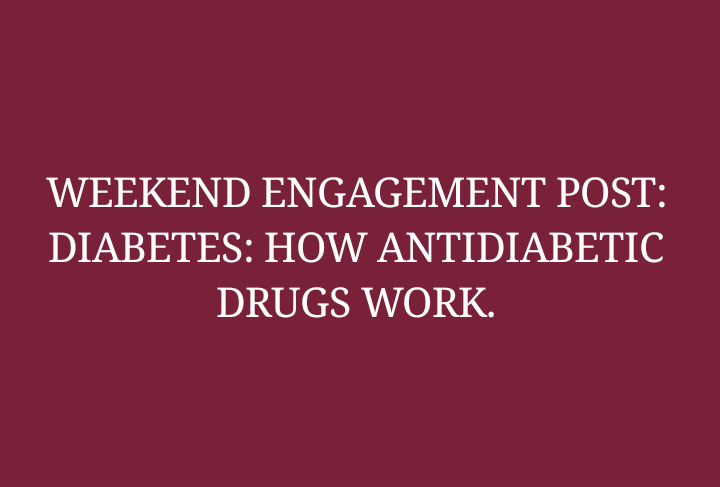
Hello friends, you ve probably wonder what drugs are taken for for the treatment of diabetes or you have friends or parents being managed for diabetes and you know they keep popping pill, but you ve never really understood what those pills do or why they are to be taken every day.
Join us on this post as we clearly define these rugs and how they work in terms you can bear with.
The aim of this post is to educate the reader on how things work so that they can be encouraged to contribute to drug compliance rates among diabetic relative or friends or even themselves.


First, what is Diabetes Mellitus?
It is a metabolic disorder which occurs when processes associated with absorption,break down, storage and excretion of sugar is disturbed and result in physiological dysfunction.
Anti-diabetic drugs play a crucial role in managing diabetes by regulating blood sugar levels. Understanding how these medications work is essential for individuals with diabetes and healthcare professionals in their care.
The primary goals are to
- Lower blood glucose levels and
- Improve insulin sensitivity.
Diabetes is a condition characterized by impaired insulin production or utilization, leading to elevated blood sugar levels. Anti-diabetic medications address this by targeting different aspects of glucose metabolism.
Now let's get into talking about the Classes but then let us keep in mind that there is no cure for Diabetes, it can only be managed over a long time.
There are many other drugs that may be adjuncts and are not part of these classes.

One common class of anti-diabetic drugs is called Biguanides, with metformin being a widely prescribed member. They work by reducing glucose production in the liver and increasing insulin sensitivity in peripheral tissues. It does not stimulate insulin release but enhances its effectiveness, helping cells absorb glucose more efficiently.

Sulfonylureas, on the other class, promotes insulin secretion from the pancreas. Examples are the glyburide and glipizide. By increasing insulin release, these drugs help lower blood sugar levels. However, their effectiveness may diminish over time, and they carry the risk of hypoglycemia (low blood sugar). A more reason why they must be properly prescribed.

Thiazolidinediones another class Aka TZDs act by improving insulin sensitivity in peripheral tissues like muscles and fat cells E.g Pioglitazone and rosiglitazoneare often good examples. These drugs work on the cellular level, enhancing the response to insulin and facilitating better glucose uptake. Despite their efficacy, TZDs are associated with side effects such as weight gain and an increased risk of heart failure so please clarify with your Doctor if you re on them.

Alpha-glucosidase inhibitors, like acarbose and miglitol, target the digestive process. They slow down the absorption of carbohydrates in the intestine, leading to a more gradual increase in blood sugar after meals. By delaying glucose absorption, these drugs help manage postprandial hyperglycemia which means increase blood sugar immediately after eating, which would be a challenge.

Incretin-based therapies, these involve hormones that affect insulin release and glucose regulation. A certain Glucagon-like peptide-1 (GLP-1) receptor agonists and dipeptidyl peptidase-4 (DPP-4) inhibitors are two main categories. GLP-1 receptor agonists stimulate insulin release, inhibit glucagon secretion, and slow stomach emptying, leading to improved blood sugar control. DPP-4 inhibitors increase the concentration of endogenous GLP-1, prolonging its action and enhancing glucose-dependent insulin secretion.
SGLT2 inhibitors represent a newer class of anti-diabetic drugs that target the kidneys. Sodium-glucose cotransporter 2 (SGLT2) is responsible for reabsorbing glucose in the kidneys. Inhibitors like canagliflozin and dapagliflozin reduce glucose reabsorption, causing excess glucose to be excreted in the urine. This unique mechanism helps lower blood sugar levels and is associated with weight loss.

Finally, Insulin therapy remains a cornerstone in diabetes management, especially for individuals with type 1 diabetes. Various insulin formulations are available, each with a specific onset, peak, and duration of action. Insulin mimics the natural hormone, allowing glucose to enter cells and be utilized for energy.

Combination therapies are often prescribed to address multiple aspects of diabetes disoders. Healthcare providers tailor treatment plans based on individual needs, considering factors such as age, comorbidities, and lifestyle.
In conclusion, anti-diabetic drugs play a vital role in diabetes management by targeting different aspects of glucose metabolism. Whether through enhancing insulin sensitivity, promoting insulin secretion, or influencing glucose absorption, these medications aim to achieve optimal blood sugar control. Individualized treatment plans, regular monitoring, and lifestyle modifications are essential components of effective diabetes care.


To help support the community you can reblog, comment, upvote or even delegate to the @med-hive community account, using the following links:
100HP | 250HP | 500HP | 1000HP
Also, you can join our voting trail and help us curate good quality content. We appreciate all the help we can get to reach out to more people that might benefit from our content and to properly reward our community authors.
Have fun and learn! We look forward to hearing from you all.


Congratulations @med-hive! You have completed the following achievement on the Hive blockchain And have been rewarded with New badge(s)
Your next target is to reach 100 posts.
You can view your badges on your board and compare yourself to others in the Ranking
If you no longer want to receive notifications, reply to this comment with the word
STOPTo support your work, I also upvoted your post!
Check out our last posts:
as a T2 diabetes person, on a metformin medication, the breakdown of what medication is used for what purpose is great